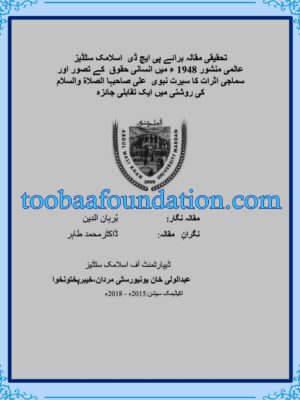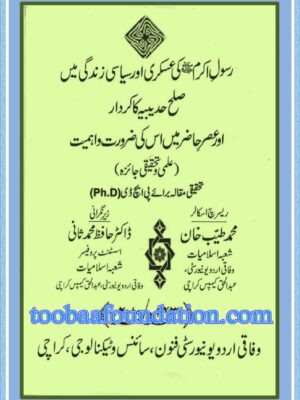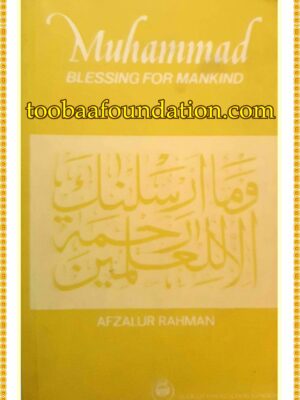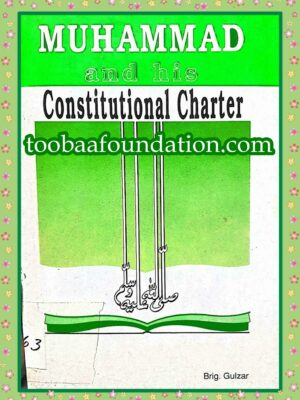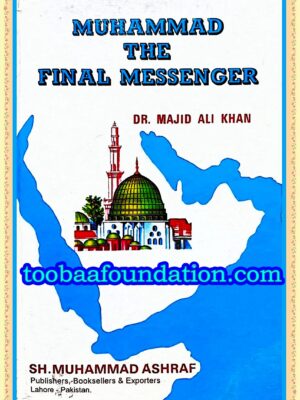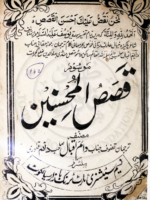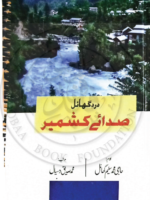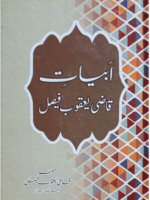-
Aalmi Manshoor 1948 Main Insani Haqooq Kay Tasawar Aur Samaji Asraat Ka Seerat e Nabviya(S.A.W) Ki Roshni Main Aik Taqabli Jaiza
عالمی منشور 1948 ء میں انسانی حقوق کے تصور اور
سماجی اثرات کا سیرت نبوی علی صاحبہا الصلاة والسلام
کی روشنی میں ایک تقابلی جائزہ
)تحقیقی مقالہ برائے پی ایچ ڈی اسلامک سٹڈیز(
مقالہ نگار: بُرہان الدین
نگران مقالہ:ڈاکٹر محمد طاہر
ڈیپارٹمنٹ آف اسلامک سٹڈیز،عبدالولی خان یونیورسٹی مردان،خیبرپختونخوا
اکیڈیمک سیشن: 2015ء – 2018ء
Aalmi Manshoor 1948 Main Insani Haqooq Kay Tasawar Aur Samaji Asraat Ka Seerat e Nabviya(S.A.W) Ki Roshni Main Aik Taqabli Jaiza
(PhD Thesis)
Research by : burhan u Din
-
Rasool-e-Akram (S.A.W) ki askari aur siyasi zindagi mein Sulh Hudaybiyah ka kirdar, aur aaj ke dor mein iski zaroorat aur ahmiyat
رسول اکرم ﷺ کی عسکری اور سیاسی زندگی میں صلح حدیبیہ کا کردار
اور عصر حاضر میں اس کی ضرورت واہمیت, علمی تحقیقی جائزہ
تحقیقی مقالہ برائے پی ایچ ڈی (Ph.D)
ریسرچ اسکالر: محمد طیب خان
زیر نگرانی:ڈاکٹر حافظ محمد ثانی
شعبہ اسلامیات
وفاقی اردو یو نیورسٹی، اسسٹنٹ پروفیسر
شعبہ اسلامیات,عبدالحق کیمپس کراچی وفاقی اردو یونیورسٹی ، عبدالحق کیمپس کراچی
Rasool-e-Akram (S.A.W) ki askari aur siyasi zindagi mein Sulh Hudaybiyah ka kirdar, aur aaj ke dor mein iski zaroorat aur ahmiyat
(Phd. Thesis)
BY: MUHAMMAD TAYYAB KHAN
-
Muhammad (S.A.W) BLESSING FOR MANKIND
Muhammad (S.A.W) BLESSING FOR MANKIND
BY: AFZALUR RAHMAN -
MUHAMMAD (S.A.W) and his Constitutional Charter
MUHAMMAD (S.A.W)
and his
Constitutional Charter
Brig. Gulzar
-
SEERAT AL-NABI S.A.W
SEERAT AL-NABI
The Life and Times of the Great Prophet of Islam
Hadrat Muhammad Rasool-Allah (may peace be on him)
and
His Chief Companions
By: Professor Dr. Mahmud Brelvi
With a Foreword by
Mr. A. K. Brohi
Chairman, National Hijra Committee
INSTITUTE OF SINDHOLOGY
University of Sind
Jamshoro, Sind, Pakistan.
1982/Rabi’-ul-Awwal, 1403 A.H.
-
MUHAMMAD (S.A.W) THE EDUCATOR OF MANKIND
MUHAMMAD (S.A.W) THE EDUCATOR OF MANKIND
BY: AFZALUR RAHMAN
-
MUHAMMAD (S.A.W) THE FINAL MESSENGER
Introduction
My endearing Dr. Maulvi Majid Ali Khan is a learned youth
who has had the privilege of having the education both in the
Western as well as in the Oriental ways. He not only obtained his
M.Sc. from the Muslim University, Aligarh, but also obtained
his Master of Theology degree and Doctorate in Sunni Theology
from there. Because of his zeal in Islamics, he also joined Dărul
‘Uloom (Arabic College), Meerut, on his own, in order to com-
plete his higher studies. He served as a lecturer in Islamic
Studies in the West Indies and then in the Deptt. of Sunni Theo-
logy at the Aligarh Muslim University. Now he is a lecturer in
Islamic Studies at the Jamia Millia Islamia, New Delhi. He is
the author of a number of books and articles on Islam in English
and Urdu and is continuously busy in writing. His most remark-
able feature is that he is an orthodox youth having sound
thoughts and great devotion for Islam.
It is a matter of pleasure that Saudi Arabia’s panel of judges
for the competition of “Research Works on Sirah” selected his
book on the “Sirah” (life of the Holy Prophet) for a coveted
award. I pray to Allah for a general recognition of his book,
Muhammad the Final Messenger, and so as to create the desire
among the readers to follow the “Sirah” of the Holy Prophet
(Sallallahu ‘alaihi wa Sallam).
Ist Şafar, 1399
(Ist January, 1979)
(Maulānā) Abul Hasan ‘Ali,
Rector (Nazim) Nadwatul Ulamā,
Lucknow (India).
toobaafoundation.com…………………………………….
Foreword
This book has the unique distinction of winning second of the
five awards of the value of SR 50,000.00; 40,000.00; 30,000.00,
20,000.00 and 10,000.00 respectively in a world competition
instituted by the Rabitat-al-‘Alam-al-Islami of Mecca (Saudi
Arabia). The judgement was given by a board of experts com-
prising great scholars of world reputation, both Arab and
non-Arab. Hence it needs no further introduction. There is no
dearth of books written in English on the life and works of the
Prophet of Islam (Sallallahu ‘alaihi wa Sallam). They however,
generally suffer from two defects: the books written by non-
Muslim authors, whatsoever scholarly they may be, lack in a
realistic approach, whereas the books, written by Muslim authors
sometime fail to represent the orthodox school of biographers
of the Prophet (Sallallahu ‘alaihi wa sallam).
This book, being safe from the above defects, can readily be
accepted as a novel and fine contribution to the “Sirat” litera-
ture in English. The main and salient features of the book may
hereunder be summed up:
(1) It is not merely a historical survey of the events related
to the life of the Prophet, but also contains an enlightened dis-
cussion of the socio-economic problems of the society in Madina
and their effective and just solutions by the Prophet.
(2) It repudiates quite convincingly and firmly the charges
levelled and the misgivings created by Western writers againstthe Prophet.
(3) The finality of the Prophet has been established on such
a firm basis as leaving no room for an inkling of doubt in the
matter.
(4) A new, modern and most up-to-date interpretation of
“Ghazawat” has been given in it, due to which one would defi-
nitely arrive at the conclusion that the Prophet of Islam never
adopted an aggressive way and that his mission was God-
guided.
(5) The basic sources of the book are the Qur’an and Hadith,
and then the original historical books.
(6) The most remarkable feature of the book is that it presents
the Personality of Muḥammad (Sallallahu ‘alaihi wa sallam) as
the most distinguished Prophet and not simply a reformer. Even
some of the leading biographers of our times have not succeeded
fully in this regard.
I am confident that this book will be of benefit to readers
in general.
8.1.1979
(Professor) Sa’id Ahmad Akberābādī
U.G.C. Professor,
Deptt. of Arabic,
Calicut University (India).
Formerly Dean Faculty of Theology,
The Aligarh Muslim University,
Aligarh (India).……………………………………………………….
